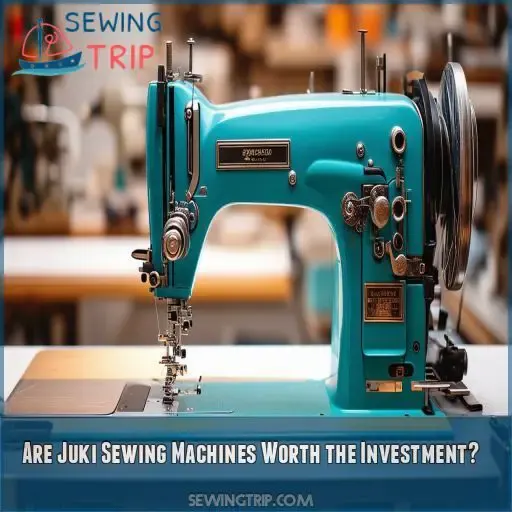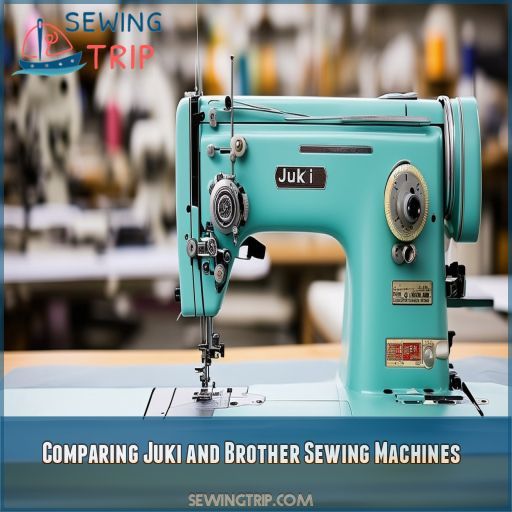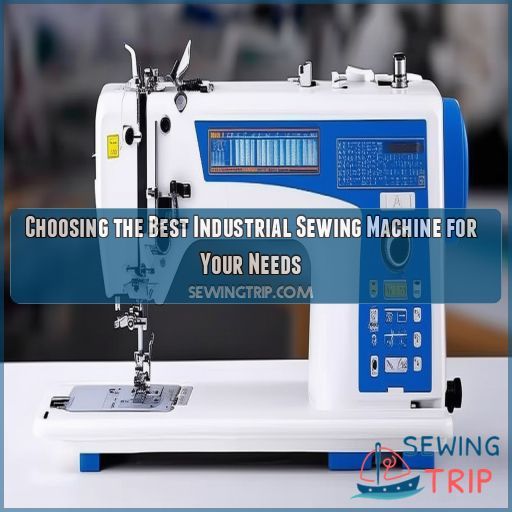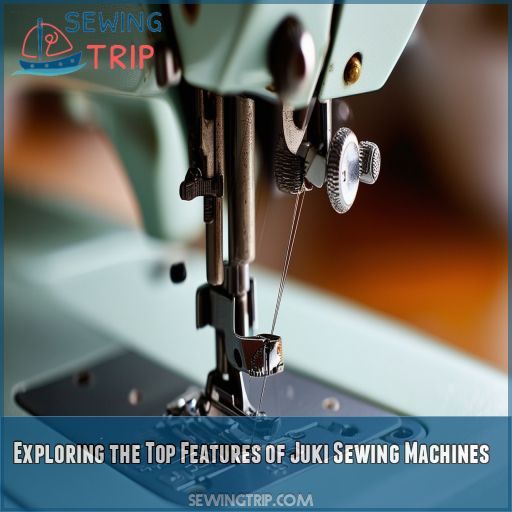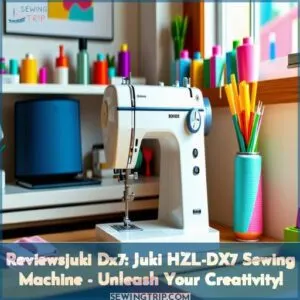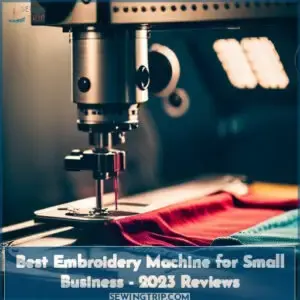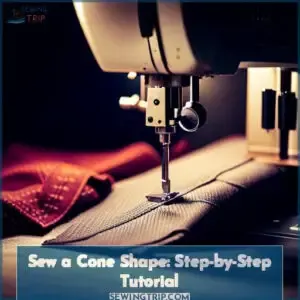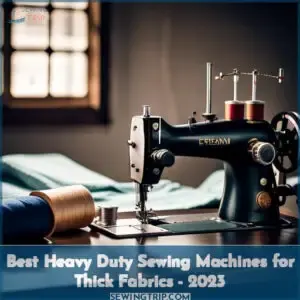This site is supported by our readers. We may earn a commission, at no cost to you, if you purchase through links.
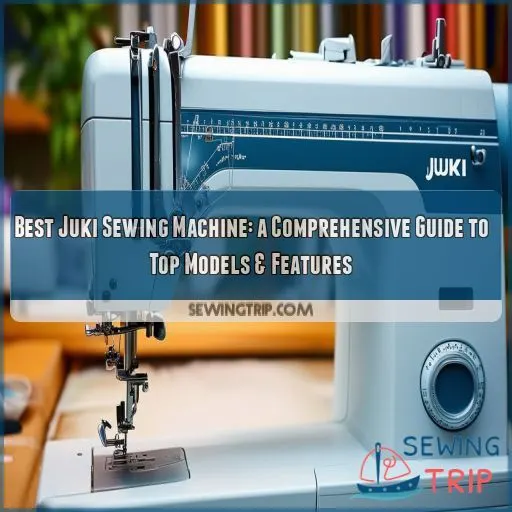 Choose the proper Juki sewing machine by looking through this overall guide of top models and features. You will find these machines have superior stitch quality, easier-to-use interfaces, and versatile applications for all your sewing needs.
Choose the proper Juki sewing machine by looking through this overall guide of top models and features. You will find these machines have superior stitch quality, easier-to-use interfaces, and versatile applications for all your sewing needs.
Comparing Juki with other options, such as Brother Machines or considering an industrial option, we got your back. Go deep into power, durability, important quilting characteristics, and ease of use to give you a better choice.
Bring out the best of your sewing projects with the reliability and innovative design that comes your way from Juki.
Table Of Contents
Key Takeaways
- Juki sewing machines are the epitome of reliability and durability, making them a perfect choice for serious sewers and manufacturers.
- Juki’s advanced engineering and precise handling of fabrics result in class-leading stitch quality.
- Juki sewing machines are user-friendly with intuitive controls and easy navigation, making them perfect for beginners and experienced sewers alike.
- Juki offers a wide range of models with versatile functionality, catering to a variety of sewing projects and needs.
Are Juki Sewing Machines Worth the Investment?
When it comes to sewing machines, one talks of top-quality performance and a reliable brand such as Juki. These are workhorses in the real sense, strong enough to undertake those heavy projects.
Stitch quality is like no other, thanks to the innovative features developed by Juki and the unbeatable engineering. Your Juki machine will, with this, definitely last long with even frequent use, as the design is put out to be durable.
Among other features, their true value lies in ease of use: Juki sewing machines are easy to use, making them a perfect option for beginners through advanced sewers. Whether you’re delving into complex quilting projects or you just need your machine to work every day, an investment in a Juki sewing machine is one that will pay good dividends.
Comparing Juki and Brother Sewing Machines
Now, when comparing Juki and Brother sewing machines, you’ll notice some key differences. Here are three highlights:
- Features: Juki machines are renowned for their power and durability, making them perfect for heavy-duty sewing and quilting. However, Brother machines often include more built-in stitch options and advanced computerized features, appealing to those seeking versatility and ease of use.
- Price: Juki machines generally come with a higher price tag due to their robust construction and industrial capabilities. Brother machines tend to be more affordable, catering well to beginners and casual sewists who need a reliable machine without breaking the bank.
- Customer Support and Warranty: Both brands offer excellent customer support. Juki focuses on professional-level assistance, while Brother provides extensive online resources and longer warranties, ensuring added peace of mind.
Choosing the Best Industrial Sewing Machine for Your Needs
Power and durability are to be concerned about in order to assure choosing the best industrial sewing machine for your needs, one equipped to handle any of the heavy-duty projects that one might consider.
Other than this, key quilting features and comfort of use are also very essential in bringing out results as a pro and keeping your work flow intact.
Power And Durability Considerations
The greatest model for an industrial sewing machine will be that considered based on power and durability. Juki has several types of heavy-duty machines, such as the DNU-1541, which provide heavy-duty performance for any industrial application.
Their TL line machines include models TL2000QI and TL2010Q, known for their reliability and low maintenance. These are able to pierce through thick fabrics with ease and make wonderful companions with tough quilting and sewing projects.
Key Quilting Features
Models of Juki industrial sewing machines take the lead, becoming the best quilting machines. The drop-feed system and 7-point feed dog system ensure continuous stitching that’s of high quality.
In this vein, the Juki TL15 Heavy Duty Quilting Sewing Machine and Juki TL18QVP Haruka Sewing Machine provide heavy-duty yet lightweight, very portable options with outstanding walking foot performance for professional quilting.
Ease Of Use Factors
In use, Juki sewing machines perform marvelously. The light weight and compact design make them very portable.
Intuitive controls and automatic needle threaders are available in some of the models for easy handling.
Furthermore, Juki is ready with a good number of its available models to fit your particular needs—from the Bernina-like HZL-F300 to rich-in-features versions such as the HZL-F600 and HZL-DX7.
Exploring the Top Features of Juki Sewing Machines
Looking into some of the best features of Juki sewing machines, class-leading stitch quality is derived from advanced engineering with very precise handling of fabrics. The intuitive interface on most models brings ease of operation, and versatile functionality caters to a gigantic chart of sewing projects.
Superior Stitch Quality
Juki sewing machines are renowned for their superior stitch quality. With models like the Juki HZL-LB5020 and HZL-LB5100, you’ll experience excellent stitch consistency due to precise bobbin tension control. Whether you’re garment sewing or creating decorative stitches like the zig zag stitch, these machines excel in fabric compatibility, accommodating various needle sizes and thread qualities effortlessly.
User-Friendly Interface
Juki sewing machines have intuitive controls and easy navigation for ease of use. The device clearly displays simplified settings, so startup is quite easy. It makes the light user-friendly design complement the precision in features like thread tensioning or armhole fitting that make Juki a joy to use compared to high-complexity machines like Bernina.
Versatile Functionality
Juki sewing machines boast versatile functionality, making them perfect for a variety of sewing tasks:
- Multi-purpose: Handle everything from wavy stitches to free motion quilting with ease.
- Portable: Lightweight and compact designs enhance portability.
- Versatililty: Models like the Juki DU-1181 and Juki DDL-8700 adapt to your diverse sewing needs.
The Juki Table Top Fabric Quilting Frame further enhances its capabilities.
Frequently Asked Questions (FAQs)
Are Juki sewing machines any good?
Juki sewing machines are the best, with a flawless performance, reliable results, and many models leveraged for every expertise level. Very durable; its stitch quality, large, and easy to use—making it value for money if one is to sew regularly.
Are brother and Juki the same?
Brother and Juki are distinct brands, each offering unique features. Juki excels in durability and industrial strength, while Brother is known for user-friendly, computerized models. Both brands suit different needs based on your sewing preferences.
What is the best industrial sewing machine to buy?
For a powerhouse industrial sewing machine, the Juki DDL-8700 is a true workhorse. Its rock-solid construction, lightning-fast speed, and impeccable stitch quality make it the gold standard for serious sewers and manufacturers alike.
Is Juki better than the singer?
Juki offers superior performance, durability, and advanced features compared to Singer. Juki’s industrial and computerized models excel in heavy-duty tasks and precision. However, the best choice depends on your specific needs and sewing projects.
What types of accessories are available for Juki machines?
Imagine a treasure chest of sewing accessories: presser feet, bobbins, extension tables, needle sets, and walking feet. Juki offers you these gems, enhancing your creativity and sewing precision for unmatched performance and durability.
How do I properly maintain and clean my Juki sewing machine?
To maintain your Juki sewing machine, regularly oil the moving parts, clean the bobbin case and feed dogs, and use the proper needles and thread. This will keep your machine running smoothly for years.
Can I use any brand of needle with my Juki machine?
You can use any brand needles with your Juki sewing machine; however, make sure it’s of the exact size compatible with your type recommended by the manual provided by your machine to give high performance and to avoid possible hiccups.
How do I troubleshoot issues with the needle threader on my Juki?
Make sure to have a properly inserted needle with its distinct threading path and not tangling the thread. Clean out the mechanism of the needle threader where all the lint collects and causes obstruction. Refer to your manual for step-by-step instructions and diagrams that will walk you through this process.
Where can I find instructional videos for operating my Juki machine?
You can find a myriad of tutorials on Juki’s website and YouTube channel, for example on how to thread it and make adjustments to its tension, but also the more advanced techniques like free-motion quilting. Get on board and master the Juki machine!
Conclusion
A stitch in time saves nine when you invest in the best Juki sewing machine. The number one contender against most other machines, such as Brother, is loaded with unmatched power and durability, better stitch quality, and a user-friendly interface.
You can look at industrial options and check them against versatile functionality at Juki; you’ll be assured of taking your projects to new heights with the right choice. This guide helps sail through the critical features so that you make an informed decision.
Experience a change in sewing experience with Juki’s finest design innovation for reliability and professionalism in design.
- bestsewingmachinereviewspot.com

